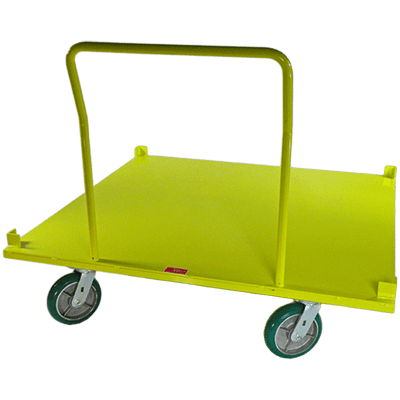Manufacturing processes are the backbone of industries, and the efficiency of these operations greatly depends on the tools and equipment employed. Trolly carts, often overlooked heroes in the manufacturing world, play a crucial role in streamlining operations, optimizing workflow, and enhancing overall productivity. In this comprehensive exploration, we delve into the various aspects that make trolly carts indispensable in manufacturing settings.
Understanding the Role of Trolly Carts in Manufacturing
Streamlining Material Handling Processes
Trolly carts (a.k.a. trolley carts) are integral in material handling within manufacturing facilities. From raw materials to finished products, these carts provide a versatile and efficient means of transporting goods across the production floor. With sturdy construction and smooth maneuverability, trolly carts facilitate the seamless movement of materials, reducing the time and effort required for manual handling.
Optimizing Workflow and Space Utilization
Efficient space utilization is a critical consideration in manufacturing, and trolly carts excel in this aspect. These carts are designed to navigate through narrow aisles and tight spaces, maximizing the use of available floor space. Whether it’s moving components between workstations or transporting tools and equipment, trolly carts contribute to a well-organized and streamlined workflow.
Types of Trolly Carts in Manufacturing
Material Handling Carts
Material handling carts are the workhorses of manufacturing facilities. Equipped with durable wheels, these carts efficiently transport materials, tools, and components throughout the production process. With customizable features such as adjustable shelves and bins, material handling carts adapt to the specific needs of different manufacturing operations.
Assembly Line Carts
In assembly line environments, precision and speed are paramount. Assembly line carts are specially designed to support the sequential assembly of products. These carts may include compartments for organized storage of components, ensuring that everything needed for each assembly step is readily accessible. The result is a smoother and more efficient assembly process.
Tool and Equipment Carts
For manufacturing processes that involve a variety of tools and equipment, dedicated tool and equipment carts become invaluable. These carts provide a mobile storage solution, allowing workers to transport tools to the point of use easily. This not only saves time but also enhances the overall safety of the work environment by reducing the need for manual lifting and carrying of heavy equipment.
Benefits of Incorporating Trolly Carts in Manufacturing Operations
Increased Productivity and Efficiency
The primary advantage of using trolly carts in manufacturing is the significant boost in productivity. By minimizing manual handling, workers can focus on more value-added tasks, leading to a streamlined and efficient production process. The ease of movement afforded by trolly carts also reduces downtime, contributing to higher overall output.
Enhanced Ergonomics and Worker Safety
Trolly carts contribute to improved ergonomics in the workplace. Ergonomically designed carts with features like adjustable handles and easy-to-maneuver wheels reduce the physical strain on workers. This not only enhances comfort but also minimizes the risk of injuries associated with repetitive lifting and carrying.
Flexibility and Adaptability
Manufacturing processes are dynamic, often requiring changes in layout and workflow. Trolly carts, with their versatility and adaptability, offer a flexible solution. Easily reconfigurable and customizable, these carts can be tailored to meet evolving manufacturing needs, making them a valuable asset in a rapidly changing production environment.
Choosing the Right Trolly Carts for Your Manufacturing Facility
Consideration of Weight Capacity and Size
When selecting a trolly, it’s crucial to consider the weight capacity they can handle. Different manufacturing operations involve varying loads, and choosing carts with the appropriate weight-bearing capacity ensures safe and efficient material handling. Additionally, evaluating the size of the carts in relation to the space available and the nature of the materials being transported is essential for optimal functionality.
Durability and Material Selection
Given the demanding nature of manufacturing environments, the durability of trolly carts is paramount. Opt for carts constructed from robust materials such as steel or aluminum, ensuring longevity and resistance to wear and tear. Stainless steel carts, in particular, are ideal for industries with stringent hygiene requirements, such as food or pharmaceutical manufacturing.
Maneuverability and Wheel Type
Smooth maneuverability is a key feature of an effective trolly. Consider the type of wheels best suited for your manufacturing floor. Swivel casters provide excellent maneuverability in tight spaces, while larger wheels are suitable for outdoor or uneven surfaces. Lockable wheels add an extra layer of safety when stationary.
Conclusion: Trolly Carts as Catalysts for Manufacturing Excellence
In conclusion, trollys stand as unsung heroes in the manufacturing realm, silently contributing to the efficiency, organization, and overall success of production processes. From material handling to assembly line support, these carts play a pivotal role in enhancing workflow and worker safety. As manufacturing continues to evolve, the strategic incorporation of versatile and well-designed trolly carts emerges as a catalyst for achieving excellence in production operations. Choose the right trolly tailored to your specific needs, and witness the transformative impact they can have on your manufacturing facility’s efficiency and productivity.



